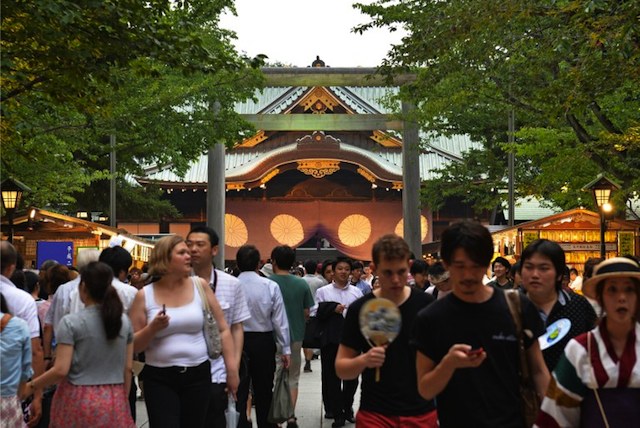SUMMARY
This is AI generated summarization, which may have errors. For context, always refer to the full article.

“I assure those of you who fought and died for your country that your names will live forever at this shrine in Musashino” – Emperor Meiji.
In 1869, after the Boshin Civil War, Emperor Meiji established the Yasukuni Shrine, meaning “Peaceful Nation,” as a way to honor and remember those who died in service to the (Emperor’s) country. In this sense, specifically with how this shrine began and who was chosen to be enshrined at the premises, some Japanese feel Yasukuni holds the same standing as the United States’ Arlington Cemetery, Confederate General Robert E. Lee’s estate, which was confiscated during the Civil War by the North to bury Union Soldiers who fell in battle.
Walking through the torii (gates) towards the shrine, you will feel the somberness. At the Chumon Torii just before the main prayer hall, there is a display that contains a different “last letter” every month, written by someone who has died from a war. These letters are generally filled with regret and sincere apologies for failing to live up to their familial duties – not a declaration of victory over a fallen foe or hateful words regarding an enemy.
But this is not how the news portrays the shrine to its readers. Instead, one normally reads a description that casts the Yasukuni Shrine as one that honors (14 Class A; and about 1,000 Class B and Class C) war criminals. In the United States, this would be on par with the hypothetical headline: “an official visit was made to Arlington Cemetery, a burial ground that honors 30,000 traitors (Confederates) who rebelled against the United States to keep African Americans as slaves.” Why would anyone want to honor slavers and traitors, right?
Yasukuni Shrine does not honor the actions of Class A War Criminals. People who pray or provide offerings at the shrine do not honor the actions of war criminals. Notwithstanding the enshrinement process, where the Shinto priests claim that it cleanses the spirit of all wrong deeds (similar to being “forgiven by Jesus/God/Priests” in the Christian belief system), people go to the shrine to pray for the wellbeing of their departed family members, compatriots, or to thank those that died for their service. Again, they do not go there to worship the heinous acts of previous wars.
Whether Japanese politicians should or should not give homage at the shrine is a personal choice. Japan, like many other free, democratic countries prescribes to the right of ‘Freedom of Religion.’ No one is forced to worship at the shrine, so why would people (or countries) try to forbid or criticize those who exercise their right to pray at the shrine? Should the Turkish people, believers of Islam, or other ‘infidel groups’ who suffered as victims during the Crusades, then be allowed to demand people stay away from the Vatican because of its prior atrocities? The answer is no – because modern day people don’t praise the actions of these horrible crimes that occurred in the past. However, people may still pray to someone that had a major role in the unfortunate Crusades, like Saint Louis IX (canonized in 1297).
I will concede there may be reason for controversy surrounding the Yuushuukan, the Military and War Museum located on Yasukuni and ran by employees of the shrine. Having visited this museum twice; watched the movies and perused the exhibits; studied Northeast Asian History; and visited Nanjing’s Massacre Memorial Hall, I can understand why some people and cultures may disagree with the historical accuracy of the information and the presentation of the material at this museum. However, it is the curator’s choice and the desired message he wants to convey. Just as it is the choice of millions of Americans, when they sit down at Thanksgiving and give “thanks” aimed at the compassion of strangers, a fruitful harvest, and/or a wonderful year, while displaying cornucopias and reenacting Native Americans offering food to the European Settlers. Although in contrast, other groups like the Native Americans may choose not to celebrate this holiday because it represents the beginning of an invasion, full of mass genocide led by brutal conquerors from foreign lands.
Everyone is taught history differently and no one wants to remember the bad times. History always depends on who lived it, who wrote it, and who has read it. If someone has the desire, an accurate summation of the truth, not just the truths assumed by the victors, can easily be found. The Japanese, like other cultures, are honoring those who made the ultimate sacrifice for their country. In a multi-cultural, multi-national world, we need to embrace these differences – and accept there are multiple sides to every story. Because if we only accept our own country’s history as fact, I fear we will never be able to understand or appreciate our neighbors for the betterment of mankind.
About the Author
United States Air Force Major (Special Agent) Christopher K. Kuchma is a military professor at the Asia-Pacific Center for Security Studies in Honolulu, a Northeast Asia-Japan Foreign Area Officer, and a Japan Area Specialist-Special Agent with Air Force’s Office of Special Investigations with more than nine years in-country experience in Japan. The views expressed in this article are his alone. Email address: kuchmac@apcss.org.
Add a comment
How does this make you feel?
There are no comments yet. Add your comment to start the conversation.